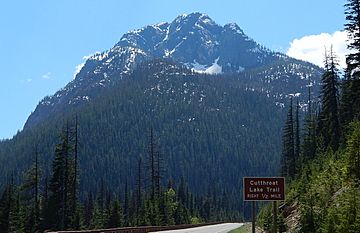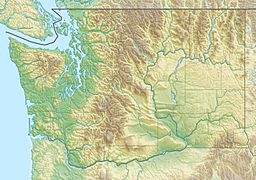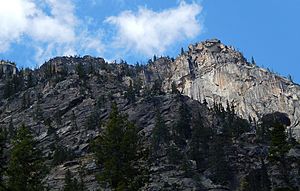Constitution Crags facts for kids
Quick facts for kids Constitution Crags |
|
|---|---|

Constitution Crags seen from North Cascades Highway
|
|
| Highest point | |
| Elevation | 6,978 ft (2,127 m) |
| Prominence | 258 ft (79 m) |
| Geography | |
| Parent range | North Cascades |
| Topo map | USGS Washington Pass |
| Type of rock | Granite |
| Climbing | |
| Easiest route | Scrambling class 4 |
Constitution Crags is a tall mountain peak, reaching 6,978 feet (about 2,127 meters) high. It's located in Okanogan County, in the state of Washington, USA. This peak is part of the Okanagan Range, which is a smaller mountain group within the larger North Cascades mountain range.
Constitution Crags sits west of Silver Star Mountain. The land around it is managed by the Okanogan National Forest. A slightly taller mountain, Hinkhouse Peak, is only about half a mile (0.72 km) to the southwest. The famous Washington Pass is just over a mile south of Constitution Crags. Also, the North Cascades Highway runs right below the eastern side of the mountain. Like many peaks in the North Cascades, Constitution Crags is known for how steeply it rises from the land around it, rather than just its height. Rain and melting snow from the peak flow into Early Winters Creek, which then joins the Methow River.
Weather at Constitution Crags
Have you ever wondered why some mountains get so much snow? It's because of how weather works! Weather systems, called fronts, start over the Pacific Ocean and move east towards the Cascade Range.
When these fronts reach the North Cascades, the tall mountains force the air to rise. As the air goes up, it cools down and drops its moisture. This moisture falls as rain or snowfall onto the Cascades. This process is called Orographic lift.
Because of this, the western side of the North Cascades gets a lot of rain and snow, especially in winter. Winters are usually cloudy. But in summer, high-pressure systems over the Pacific Ocean often bring clear skies. The snow here tends to be wet and heavy because of the ocean's influence. This can sometimes lead to a high risk of avalanches.
How the Mountains Formed
The North Cascades mountains are known for their rugged look. They have sharp peaks, long ridges, and deep valleys carved by glaciers. The amazing shapes of these mountains and the big changes in height happened over millions of years due to powerful geological events. These changes also created different climates and types of plants in the area.
The story of the Cascade Mountains began millions of years ago, during a time called the late Eocene Epoch. At that time, the North American Plate (a huge section of the Earth's crust) was slowly moving over the Pacific Plate. This movement caused many volcanic eruptions.
Also, small pieces of the Earth's crust, called terranes, crashed into North America about 50 million years ago. These collisions helped build the North Cascades. Constitution Crags itself is mostly made of granite from a large underground rock formation called the Golden Horn batholith.
About two million years ago, during the Pleistocene period, huge sheets of ice called glaciers moved across the land many times. As they advanced and retreated, they scraped away the landscape, leaving behind piles of rock. The "U"-shaped valleys you see in mountain rivers are a result of these glaciers. The lifting of the land (called uplift) and cracks in the Earth's crust (called faulting), along with the glaciers, are the main forces that created the tall peaks and deep valleys of the North Cascades.
Images for kids





